Miranda Mercury is something of an anomaly to me: she’s a female brown skinned hero with the agency of her own body in a sci-fi tale. She’s the titular character and not the side kick (Although I would love her even if she was) She’s not a “flat character”. There’s dimensions to her: she’s immensely fleshed out to where readers can relate to her, sympathize with her and worry for and about her. Even her family is something you don’t see much in comics: a family of black folk all scientists and heroes with their own individual accomplishments and strengths. There’s also the fact that artists Lee Ferguson and Marc Deering helped make Miranda stand out even more on paper—we know that she’s African American even drawn in black and white art because of her hair’s texture…And if you’re reading this and you don’t know who she is probably because you’ve been hiding under a rock you can read a preview here of her adventures here. For our newest Carcosa Interview, we were lucky enough to catch Brandon Thomas who is a Southern Californian dwelling, comic book writer and creator who is bent on seeing more diversity period but especially in the comic book industry.
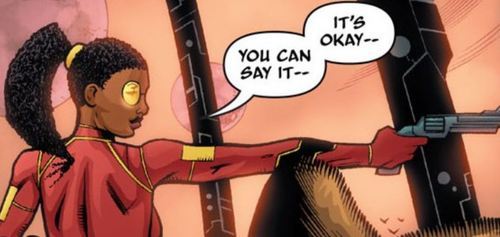
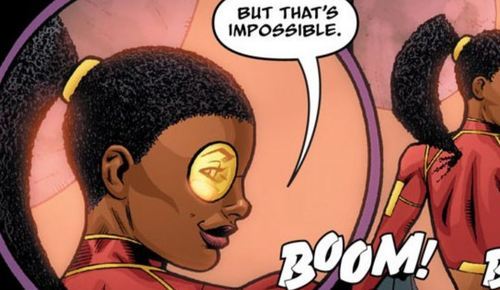
Black Nerd Problems: With all my fangirling aside, Brandon what’s next for Miranda? I understand that Volume 2 of The Many Adventures of Miranda Mercury is currently in production. How is the progress of that coming along and what updates can you give us?
BT: I’m about a script and a half from being done, and Lee is almost two issues in, with the colors already underway. Obviously, we’re really excited about the prospect of new stories, but also being able to take all the hard lessons we learned doing the first volume, and return with a more polished, streamlined product, is going to be huge for us down the road. We are proud of what we’ve already done, but volume 2 will be a better look at what Miranda Mercury can ultimately be. Oh, and expect some tears before it’s all done.
BNP: That’s exciting news! So in regards to Miranda who is a kick ass, black, female heroine —what are your thoughts to representation and diversity in the comic book world now since you first introduced Miranda to us? Do you feel a little more hopeful? Or do you feel a “great disturbance in the force”? Also are there any comics that you currently reading now that reflect your interest given all the big news regarding both diversity of people of color and women in comics lately?
BT: I’m always hopeful. I think the obvious surge in the numbers of titles being led by female characters is a fantastic thing to see, and anything that’s contributing to the recent success of great books like Lazarus, Saga, Sex Criminals, She-Hulk, Mind Mgmt, Sheltered, Ms. Marvel, Rat Queens, Velvet, etc., is necessary for the industry as it makes up ground. Seeing an increase in female creators and editors at a number of the major companies is also an encouraging sign of things to come.
What concerns me is that just because we’re doing a “better” job of it in recent years doesn’t mean we’re actually doing a “good” job of it. Some of the commentary, if you can even call it that, that some of the female members of our comics press/blogosphere receives from portions of the fan base whenever they dare to critique or criticize any aspect of comics’ piss-poor history with gender and racial diversity is just deplorable, disgusting nonsense.
With any luck, we’ll be able to flush these degenerates out of the mix over these next few years, because happy to break it to these folks, what you’re seeing now is just the beginning. The diversity and sense of inclusion some people are so afraid of is not coming, it’s already here, and if you legitimately love comics, and want everyone to feel reflected and invested in this medium we claim to love, there’s no reason to fear something like Sam Wilson as Captain America, for whatever obviously temporary length of time that’s going to be.
The next obvious step is going to be increasing and broadening the numbers of people of color working in prominent positions within comics. To some, the word “diversity” just means white women, and even then, only confined to certain books and projects. Until we make a true commitment to ensuring that “comics are for everyone,” the great books I mentioned and the race-switching we’ve seen recently are ultimately not enough to reverse decades of hostility and casual disregard.
BNP: I picked up The Many Adventures of Miranda Mercury (digitally) from ComiXology during their “BOOM! Leading Ladies” sale not too long ago back at the end of August. How do you feel about digital comics in general? Did you ever think that this art form would be so accessible thanks in part to technology and how much do you think you’ve benefited as an artist due to it?
BT: The most important thing about digital is that it levels the playing field. Since I was introduced to the idea of a “comics shop” back in 1992, I’ve been one of those people that gets the shakes whenever I can’t drop by my neighborhood supplier every Wednesday (which has made adapting to mail order still a never-ending battle for me) but as euphoric as that experience is for some of us, the business model isn’t always conducive to keeping work by independent or emerging companies/creators well stocked and available for someone just wandering in off the street. The big companies and the big creators have in many ways earned their share of the limited shelf space available in those stores, and until you do the same, you can’t expect to push through by sheer force of will alone.
Publishing digitally somewhat eliminates that concern, and it usually offers people a more economical (meaning cheaper) avenue for sampling books with unfamiliar characters and creators. I have discovered dozens of creators who I’d never heard of before through digital comics, and the majority of Miranda Mercury’s sales have come through digital, traditional book stores/Amazon, libraries, etc. I’ll admit, it took me some time to warm up to the idea and importance of digital, but both as a creator and a consumer, there’s no doubt it’s already a game-changer, even though digital comics are really only in their infancy. When we started MM, I had no clue that it would grow to be indispensable, and extremely excited about what the future holds for the industry as it takes further hold.
Anything that leads to getting the book into people’s hands (like yours), which leads to conversations (like this) is how any independent comic will survive in the marketplace. Everything is about access, and digital provides it in a way that’s impossible to dismiss.
BNP: You’re well versed in the way that you’ve worked for several comic book companies including “The Big Two”, Marvel and DC Comics and smaller yet still awesome companies like Dynamite—what were your favorite runs as a writer for any of those years and what character(s) grew to be your favorite?
BT: I loved writing Tim Drake for an issue, because he is my favorite character. When I came into comics, DC was just in the process of introducing him, so I grabbed onto him like a life preserver and made it my mission to own every single appearance of his character. Couple that with my eventual love of Chuck Dixon’s work, and that’s the guy I love more than anyone else. My dog’s name is Drake, that’s how serious this is, so getting an opportunity to not only pitch for the book, but have a fill-in issue published featuring him was an honor.
If we’re talking runs, it’s Voltron, no question. The amount of freedom and support I got from Dynamite and Classic Media (the licensors) was a great thing to experience, and despite some bumps in the road, I’m really proud of a lot of what we did. They gave me the opportunity to write two monthly comics for a stretch of time, and despite some initial trepidation, I proved to myself that I could handle it, which was an important step for me personally. Like I said before, I’m always hopeful, and there’s a part of me that believes wholeheartedly that one day I’ll get to return to it and finish the larger story I was planning. Loved the process, loved the fans, loved the results. Made me feel like an actual professional comics writer, and it’s a sensation I’ll never forget and kill myself trying to recapture.
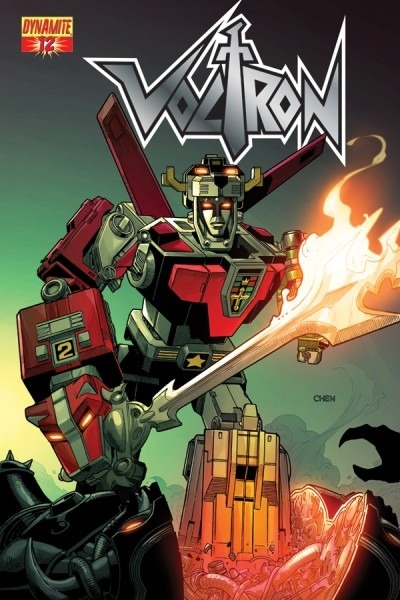
BNP: You’ve talked about your life long love of Voltron and how important it was was to you developing your sphere of things nerdy years ago. Now that your run has ended, do you have any favorite stories of interacting with fellow Voltron fans?
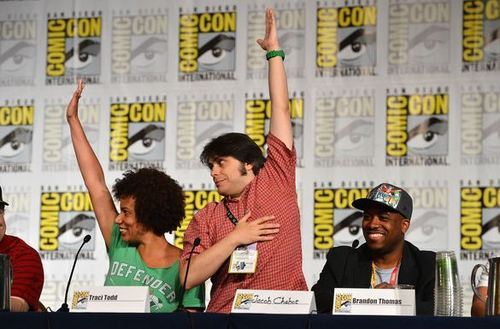
BT: Well, being able to have actual face-to-face conversations with people that I’d known only from the Voltron boards at cons and signings was pretty fantastic. Several weeks ago, I was able to do like an “exit interview” of sorts with Marc Morell on the “Let’s Voltron” podcast where I got to talk about my run at length, including some of the stories and character arcs I wasn’t able to finish off properly. It was an opportunity to get everything out of me one last time, and talk about every single facet of the gig and what it meant to me. Not sure if that’s my absolute favorite, but it’s the most recent and felt pretty notable, after having to keep things fairly close to the vest while I was working on the books.
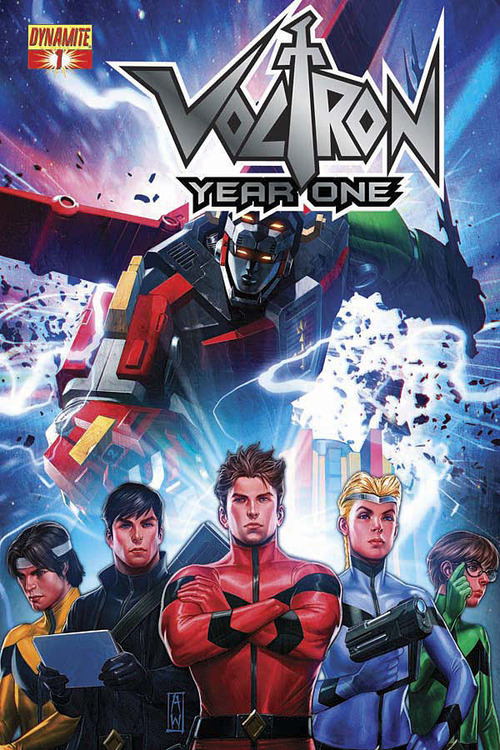
BNP: You’ve also talked about having a great love for reading in general during your childhood. You’ve spoken of your father, who, was a big comic book fan in his own right taking you along with him to comic book stores which pretty much sealed the deal for you. Before your professional writing career in the comic book industry , you wrote reviews of comics and then you wrote columns online…what the defining moment that made you think, “I’m going to be a comic book writer.” What turned the key inside that made you want to go down this road?
BT: It was Chuck Dixon’s panel on the Ten Commandments of Comic Book Writing that flicked the light bulb in my head, and rescued me from a life of writing action adventure and mystery novels. His essays on writing comics, posted up on his Dixonverse website, provided my first formalized instructions on how it was supposed to be done, it was also his scripting technique that became the framework for what I’m still using to this very day.
If we’re just talking about that initial spark, it was Star Wars on VHS. Watched it for the first time at my grandmother’s house (Miranda’s grandma is named after her) and she never saw that tape again. There was a whole summer where I’d get up and watch the movie before I did anything else. It was and still is everything to me, and gave me the one thought that ultimately steered me through my entire life—“Well, what if this happened?”
BNP: And OF COURSE, there is this question—what is your advice to the kids (and the adults!) reading comics and graphic novels dreaming of the day to one day write them? Any less than glamorous on the job tasks that you’ve had to endure that inquiring minds should know about?
BT: Equal parts patience and persistence. It is going to take a long, long time to make real progress, and you have to be able to weather the storms that always come at the worst possible times. The thing that’s helped me immensely in the last five or so years is having some balance in my life. For years, breaking into comics as a writer was legitimately the only thing I really, really cared about, so when it was going sideways on me, I almost let it completely screw up my entire life.
It’s easy to become consumed and overwhelmed by our ambitions and aspirations, and that’s the situation I would urge people to avoid. Run hard at it, but run smart, and dismiss this idea that you’re gonna be the one to make it in after only putting in 2-3 years to get going. Sure, it’s possible, but plan to hustle and sweat for 7-10 years before it really starts to pay off. When it does, you’ll have the right level of experience, appreciation, and perspective to pay it all forward. Cause that’s really what we’re doing, despite our own personal goals—that feeling that made you need to be a writer to survive? You’re ultimately trying to trigger that in someone else that gets exposed to your work. It’s always bigger than just you.
The one thing I feel the most uncomfortable with is probably the constant need for self-promotion and personal marketing that you need to build and sustain a career. Very necessary to ultimately succeed, and I’ve gotten a lot more comfortable with it, but there’s still a smart part of me that feels like, “Please stop talking about yourself and your work all the time.” If I had my way, I’d just write, do interviews like this one, and let that be that. But the creators that are really relevant these days have a massive social media presence and profile that I’m still struggling with. Maybe I just need a publicist or something to handle all that, cause if you want to be able to make this into a fully functioning career, it’s part of the game.
BNP: It looks like you nerd hard in other mediums as well, you podcast too! You’re attached to a podcast titled, “The Two Brandons” with fellow writer Brandon Easton. Do you mind telling us the origin story behind the podcast?

BT: Easton and I had known each other for years, and he already had a successful podcast of his own called Writing For Rookies, but what did it was this column I wrote titled “You Have to Buy It.” Essentially, it dealt with a dirty little secret of comics fandom, most specifically the large number of minority fans that continually chastise the major companies for their lack of diversity, yet the very same fans somehow manage to ignore or overlook the healthy number of minority creators already producing great independent work that desperately needs support. It’s been one of those things that’s often discussed among black writers, but people are finally starting to create a real dialogue about it, which is important, because everyone needs to take some responsibility for “the way things are.”
So the column started a nice discussion between us, and after a little back-and-forth it seemed a good idea to team-up to discuss this and a ton of other issues affecting us both as black fans and creators. That’s not all we talk about of course, but think it’s far to say it is a point of emphasis for us, and I think anything that broadens the look and feel of modern fandom is vital going forward. Sure I don’t have to tell you about it, but not everyone who loves comics, movies, genre shows, etc. is a straight white male, and dispelling that myth will only lead to better, more diverse products available, and an industry that’s more welcoming to everyone that wants to participate in it.
BNP: Last question: Any “secret projects” that you’re working on that you’d like to shed light on?
BT: Absolutely. There’s this one thing that I’ve thrown myself into for the last several months that could be a tremendous opportunity for me, and the best thing I’ve ever written. Developing it has been a process, but it’s one of those situations where if it’s greenlit, should be a game-changer professionally, and everyone will understand completely why I’ve been a little unreachable lately. Everybody cross your fingers for me, cause this book is just as necessary as Miranda Mercury was.
BNP: Finger crossed, Brandon! Looking forward to seeing great things!


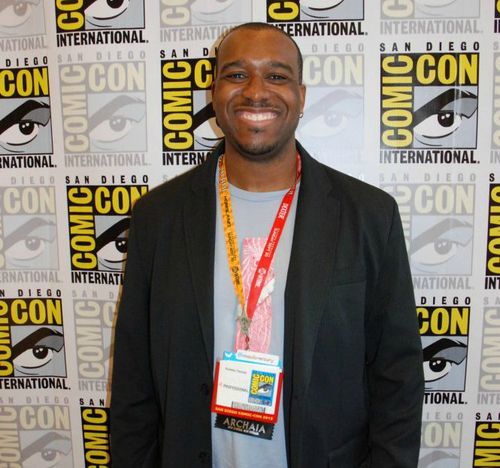
Show Comments